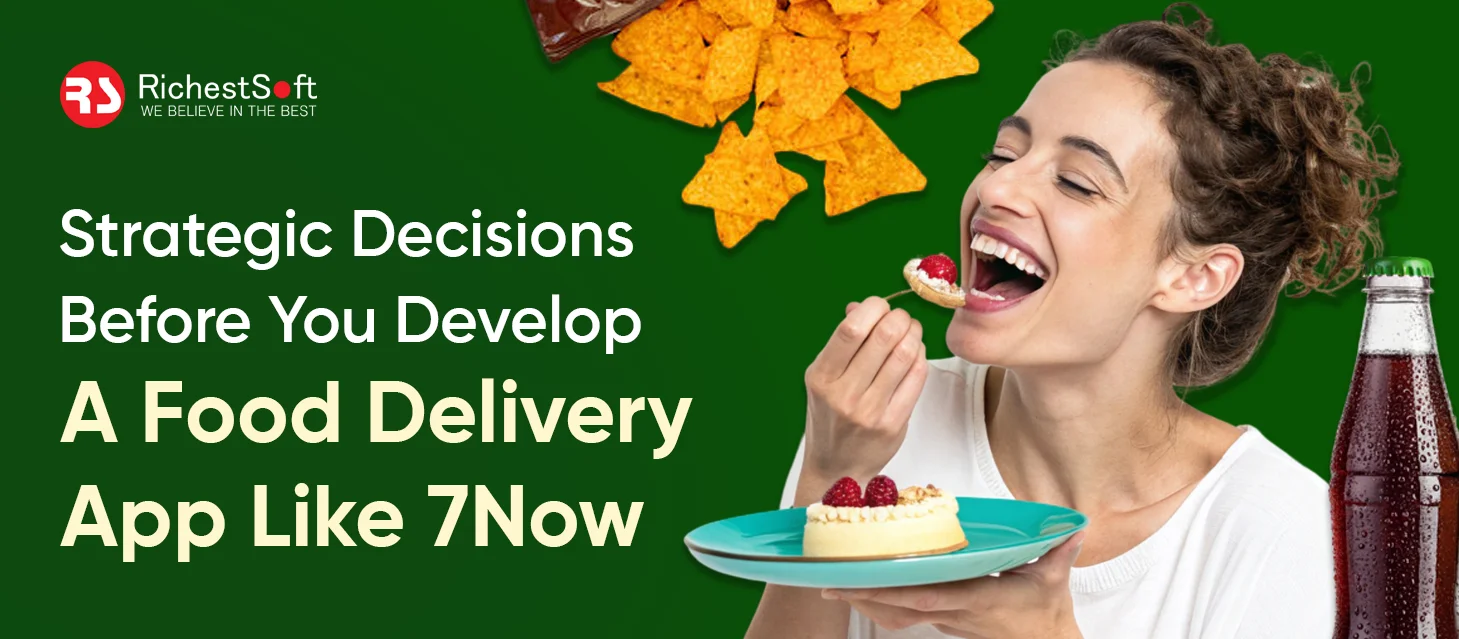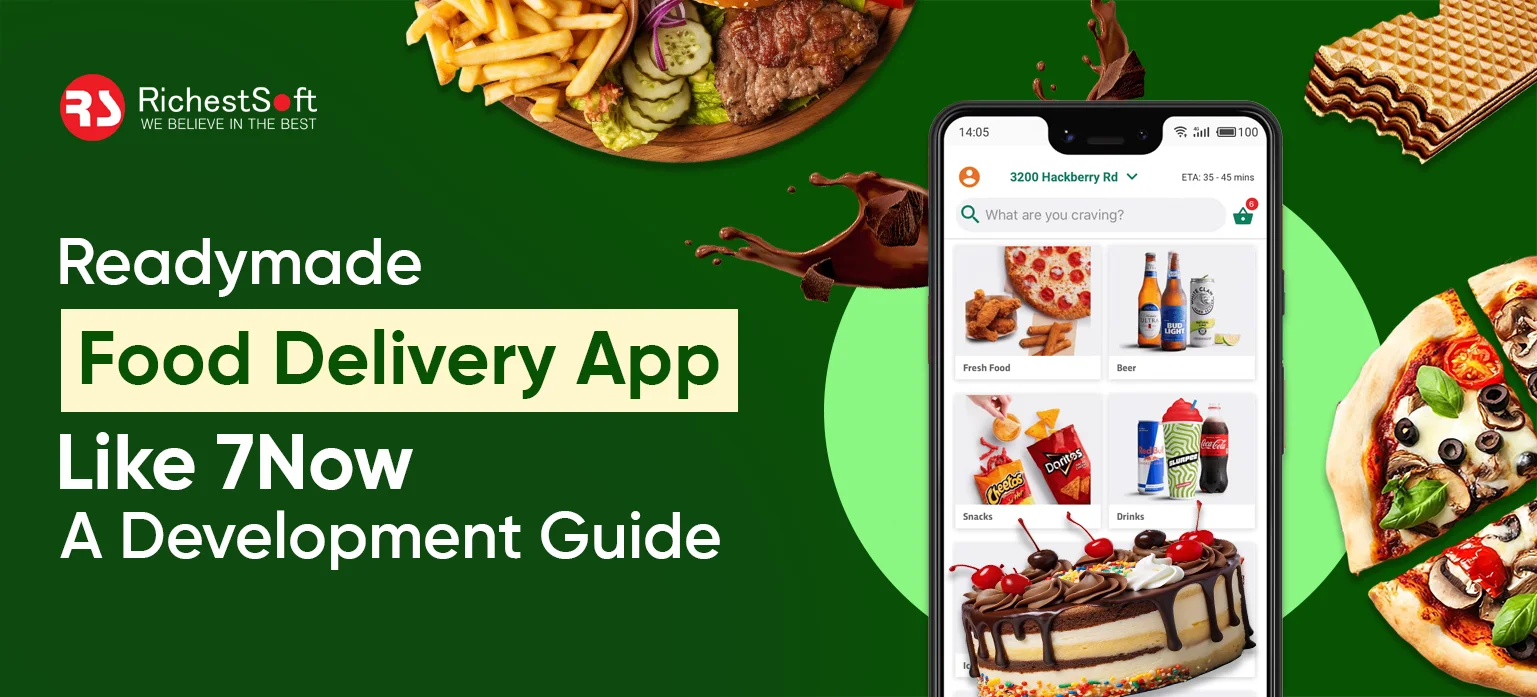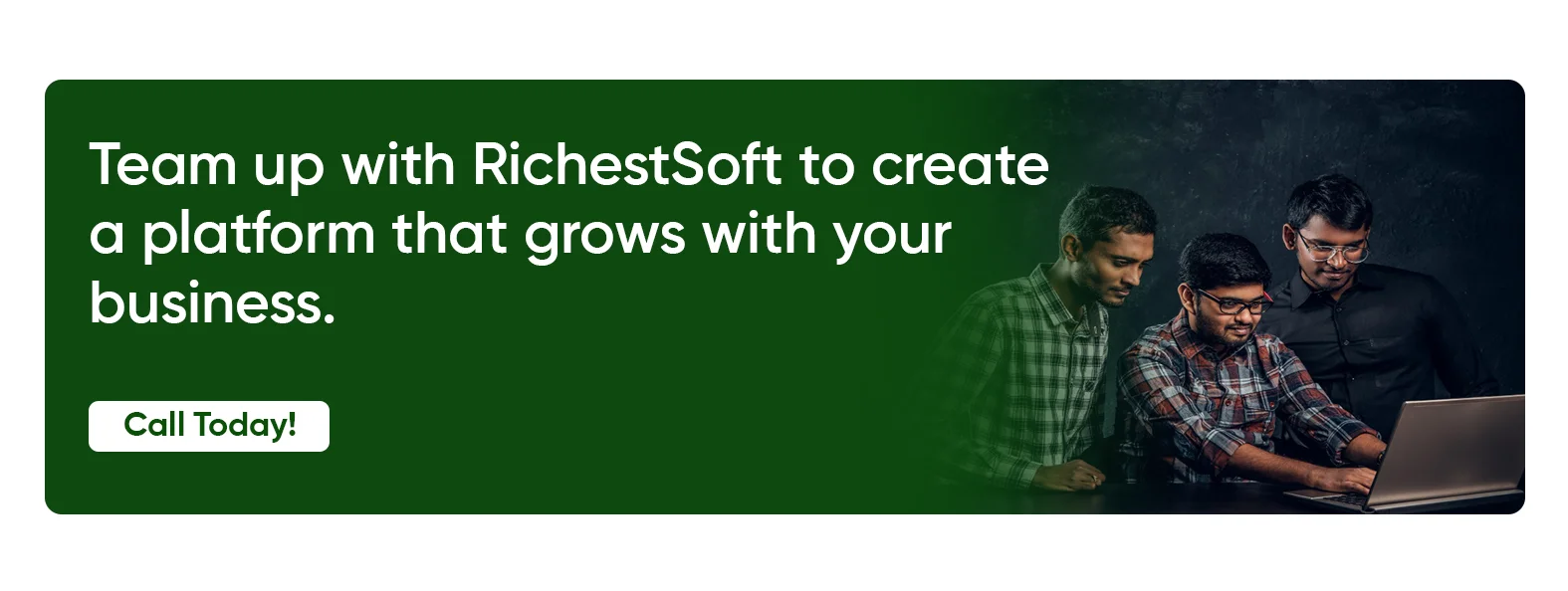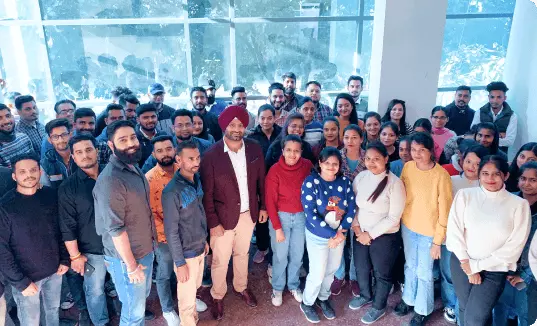September 25, 2025
In today’s fast-paced world, on-demand food delivery apps make ordering meals easier than ever. A readymade food delivery app like 7Now lets you launch your own platform quickly, offering users seamless ordering, real-time tracking, and easy payments—while helping restaurants manage orders efficiently. It’s a smart way to enter the q-commerce industry without building from scratch.
If you are also looking to develop an app like 7Now, the opportunity is significant, but so are its challenges. This guide will help you get the right understanding of technology, operations, and strategy required to build something sustainable.
Market Landscape and Business Potential
Q-commerce is no longer a niche. The global instant delivery market is expected to be one of the highest-grossing globally in the coming decade. And the major reason behind this is the drastically changing urban lifestyle, increasing disposable income of people, and also the widespread use of smartphones. Three major trends stand out:
-
Dark Stores as Enablers
Many q-commerce players operate small fulfillment hubs designed for speed rather than in-store shopping. These “dark stores” allow faster picking, packing, and delivery, making the 15–30 minute promise realistic.
-
Consumer Behaviour Shifts
Customers increasingly value time savings over discounts. The ability to get household items or late-night snacks instantly has created a loyal user base.
-
Investor Interest
Venture capital and corporate investment in this sector remain strong. Businesses that move early with the right model can attract funding and partnerships more easily than late entrants.
Strategic Decisions Before You Develop a Food Delivery App Like 7Now

Before moving into development, you need clarity on business goals. Some key considerations include:
-
Defining the Model
Before diving in, think about the model you want. Will the app focus solely on delivering groceries and snacks, just like the 7Now platform? Or would you also prefer to include delivery of other essential items, like pharmacy products or even non-food items? Planning and defining the scope early lays down a clear roadmap and prevents the addition of unnecessary features later on.
-
Custom vs. Readymade Development
The type of app development strategy you want, whether a custom or readymade app solution, also matters because each one has its own pros and cons. For instance, readymade solutions are definitely quicker to launch and often come at a lower cost, but they can restrict scalability during expansion. A custom build, on the other hand, gives you room for customization and offers long-term growth potential, but it does require a higher upfront investment.
-
Compliance and Regulations
Another crucial part is to adhere to the regulations. Since you’ll be in the food delivery business, it means you must obtain appropriate licensing, safety standards, and local delivery laws. Building compliance into the system from the beginning simply avoids any costly legal hurdles.
-
Cost Forecasting
Lastly, financial implications must be considered beforehand. Businesses often underestimate operational expenses. Delivery fleet management, real-time tracking, and cloud infrastructure can all affect unit economics if not planned well.
Step-by-Step Roadmap for Development
A successful app like 7Now isn’t built overnight. It goes through several structured stages:
-
Discovery and Research
The development process begins with analyzing the existing competitors and understanding the target market as well as the expectations of customers. Before creating anything concrete, it is highly crucial to refine the business model and get everything sorted out.
-
UI/UX Design
Quick delivery doesn’t excuse a poor interface. The design must make ordering simple. There must be fewer clicks, faster checkouts, and clear product displays.
-
Backend Development
The next stage is developing the backend. Here, the focus is on operations like real-time order management and inventory synchronization with warehouses or dark stores. Keeping these optimum ensures scalability even under heavy loads.
-
Major Integrations
This step involves connecting the right services in the app, like payment gateways, third-party logistics, loyalty programs, and even marketing tools. Also, add flexible APIs as they make it easier to add or switch services as your business grows.
-
Testing and Compliance
Before the final launch, every feature of the app undergoes careful testing for security, performance, and data protection. Additionally, compliance with regional laws, including GDPR for data privacy or local food safety standards, is checked before launch.
-
Launch and Scale
Finally, the app becomes live through a soft launch as it helps identify bottlenecks. Once the platform proves its stability, scaling to multiple cities or categories becomes a lot easier and smoother.
Technology Foundation and Integrations
The right technology behind the readymade food delivery app like 7now is one of the most critical decisions. It directly affects the performance and thus must be carefully chosen right at the beginning for long-term growth.
- Cloud Infrastructure ensures the platform stays reliable even during peak order times.
- AI and Machine Learning can be used to forecast demand more accurately and prevent wastage, especially for perishable items.
- IoT Devices can track factors like temperature and freshness for sensitive items like dairy or frozen foods.
- API-Driven Ecosystem makes it easier to integrate logistics partners, loyalty vendors, and new payment systems without having to rewrite the core app code.
Monetization Models for Sustainability
Revenue streams must be diversified to build a long-term business. Some proven models include:
- Commission on Orders from partnered stores.
- Delivery Fees that vary by distance or speed.
- Subscription Plans offering free delivery or discounts.
- In-App Promotions, where brands pay for visibility.
- Eco-Friendly Packaging Fees, appealing to conscious consumers.
Balancing affordability with profitability is essential. Apps that charge too heavily on one side risk losing either customers or partners.
Lessons from Global Leaders
Several players worldwide offer insights on how the best food delivery apps function. The following are some examples highlighting that different models are okay as long as the app supports a strong tech backbone and customer-centric approach, two non-negotiable factors.
- Zepto (India): Success through a dense network of dark stores, making 10-minute delivery possible.
- Meituan (China): Experimenting with drone deliveries shows how innovation can improve efficiency.
- GoPuff (US): Demonstrates the viability of essentials-first delivery with a strong focus on operational excellence.
The Future of Quick Commerce
The future brings great potential for Q-commerce apps as this sector continues to evolve. If you plan to invest today, you are basically future-proofing yourself for a market that will look very different five years from now. Some expected transitions include:
- Automation and Robotics will eventually take over, reducing dependency on human riders.
- AI-driven decisions will start altering the user experience. It will optimize pricing, demand forecasting, and marketing in real time.
- There will be more focus on green delivery with electric fleets.
- Biodegradable packaging will become a standard rather than an option.
Conclusion
The trending wave of quick commerce is reshaping delivery service as well as customer expectations, and apps like 7Now prove that convenience can be turned into loyalty and revenue generation only if you have the right tools handy. The true chance to capture this market amidst so many competitors lies in combining the right model, technology, and operational discipline.
By partnering with an experienced Food Delivery App development Company like RichestSoft, it becomes possible to launch a Readymade Food Delivery app like 7now, designed for scale, compliance, and profitability.
RichestSoft brings years of experience in custom and readymade app development, working with clients across industries to launch platforms that are both user-friendly and business-ready.
The opportunity is here, the question is whether your business is ready to seize it.
 +1 315 210 4488
+1 315 210 4488 +91 99888 06489
+91 99888 06489








